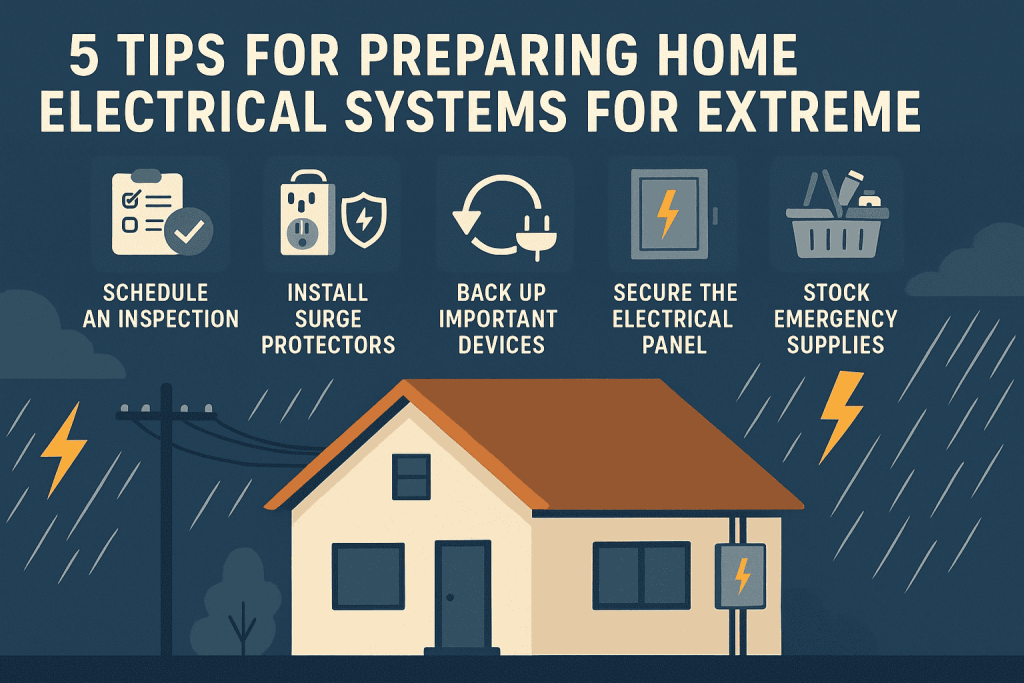Extreme weather events such as heavy rains, heatwaves, storms, or freezing conditions can severely affect your home’s electrical system. From power outages to dangerous surges, your electrical infrastructure is vulnerable if not maintained properly. At Brea Electric, we believe that proactive preparation can protect your home, safeguard your family, and extend the life of your electrical systems.
Here are five practical and SEO-friendly tips for preparing your home electrical systems for extreme weather conditions.
1. Schedule a Professional Electrical Inspection
Before extreme weather arrives, it’s crucial to have your home’s electrical system inspected by a licensed electrician. Regular inspections help detect hidden issues such as:
- Loose wiring that can spark during storms.
- Overloaded circuits that may trip under stress.
- Outdated panels that can’t handle modern electrical demands.
By catching these problems early, you reduce the risk of costly damage during harsh weather conditions. At Brea Electric, our certified technicians provide comprehensive electrical inspections tailored for Southern California homes.
2. Install Surge Protection Devices
Lightning strikes and grid fluctuations during storms often lead to sudden power surges. These surges can damage appliances, electronics, and even wiring inside walls. To prevent this:
- Install whole-house surge protectors at the electrical panel.
- Use high-quality surge-protected power strips for sensitive electronics.
- Upgrade outdated outlets with ground fault circuit interrupters (GFCIs), especially in moisture-prone areas.
This small investment ensures your expensive equipment is shielded from unpredictable voltage spikes.
3. Backup Power With Generators or Battery Systems
Power outages are common during heatwaves, hurricanes, or heavy rains. A backup power system can keep essential devices running, such as refrigerators, medical equipment, and communication devices. Consider:
- Portable generators for temporary backup.
- Standby generators for automatic power restoration.
- Battery storage systems paired with solar panels for eco-friendly, continuous power.
By integrating backup systems, your home stays safe and functional, even during extended blackouts.
4. Weatherproof Outdoor Electrical Components
Outdoor electrical outlets, panels, and wiring are particularly vulnerable during extreme weather. To protect them:
- Install weatherproof covers for outlets and switches.
- Use properly rated outdoor extension cords.
- Seal exposed wiring with protective conduit.
- Ensure outdoor lighting and pool equipment are connected to GFCI outlets.
Weatherproofing not only prevents electrical hazards but also improves the longevity of your outdoor systems.
5. Prepare a Home Electrical Safety Plan
Finally, every household should have an emergency electrical safety plan. When storms hit, knowing what to do reduces risk and confusion. Steps include:
- Teach family members how to shut off the main breaker in case of flooding or sparks.
- Keep flashlights and battery-powered lanterns in accessible places.
- Avoid using appliances if water enters your home.
- Regularly test smoke detectors and carbon monoxide alarms to ensure they work during outages.
A proactive safety plan provides peace of mind and helps you respond quickly to emergencies.
Final Thoughts
Preparing your home electrical system for extreme weather is not just about preventing damage—it’s about protecting your family’s safety and comfort. From inspections and surge protection to backup power and safety planning, every step you take adds resilience to your home.
At Brea Electric, we specialize in residential electrical services designed to withstand Southern California’s toughest weather conditions. Don’t wait for the next storm—schedule an inspection today and keep your home powered, safe, and prepared.

